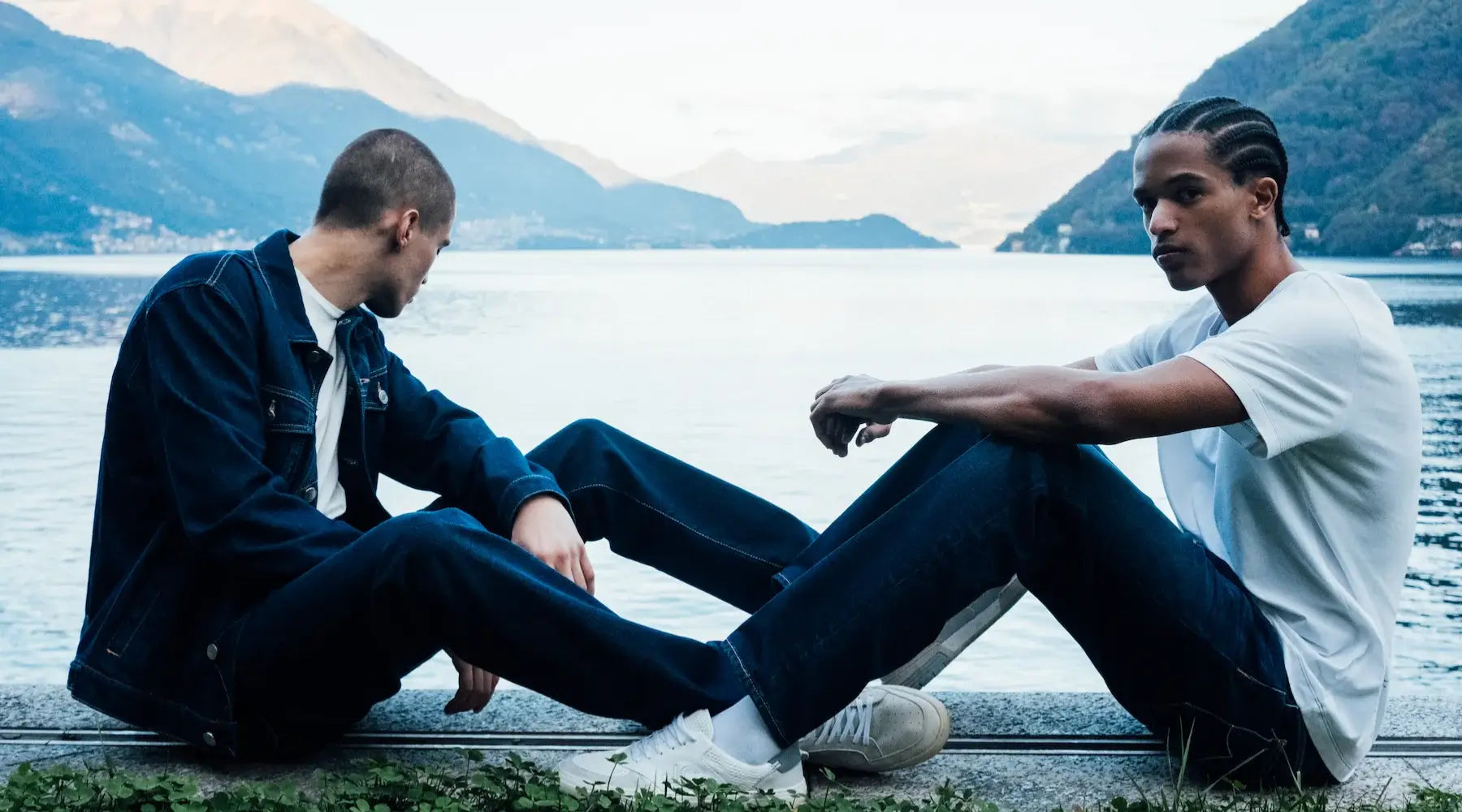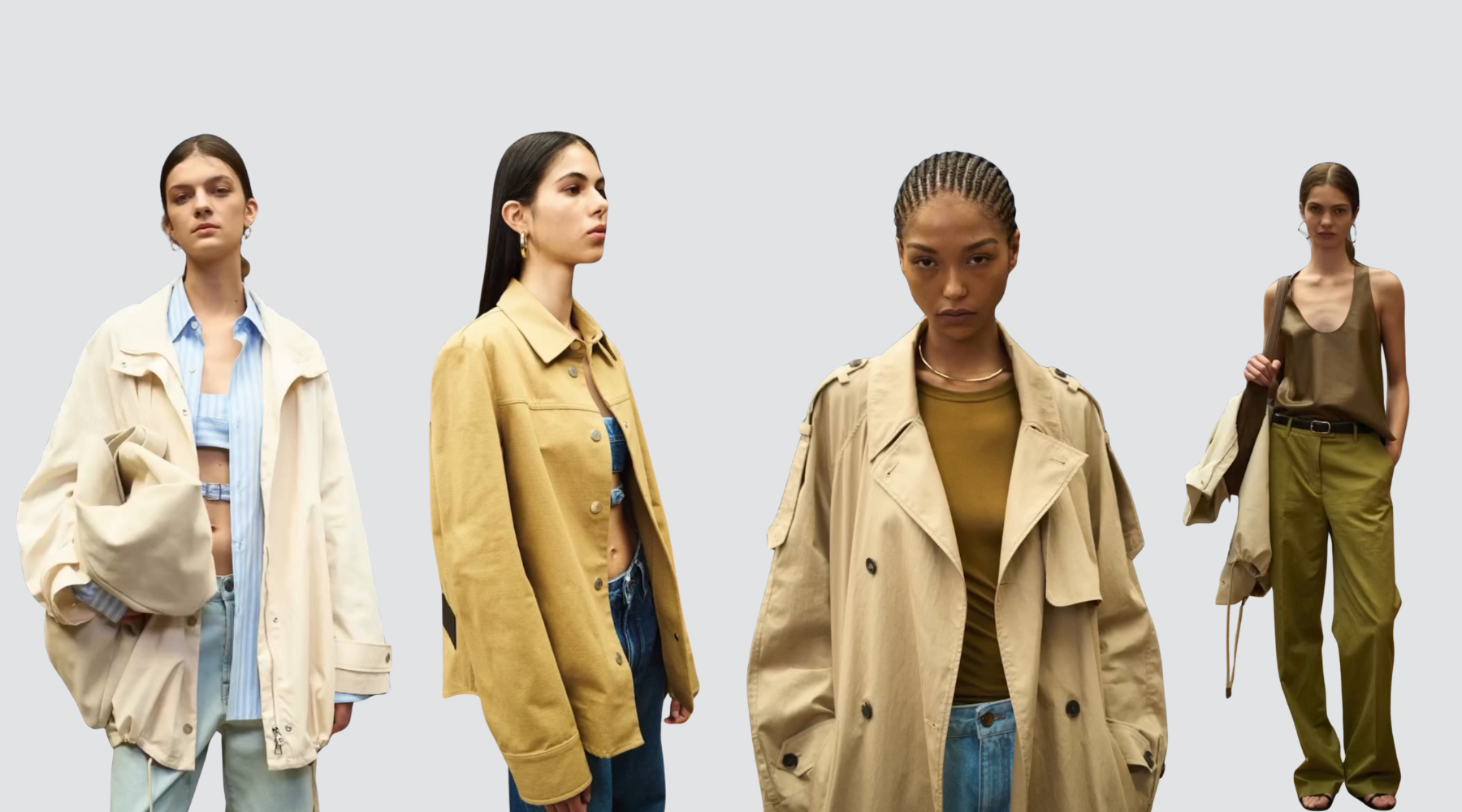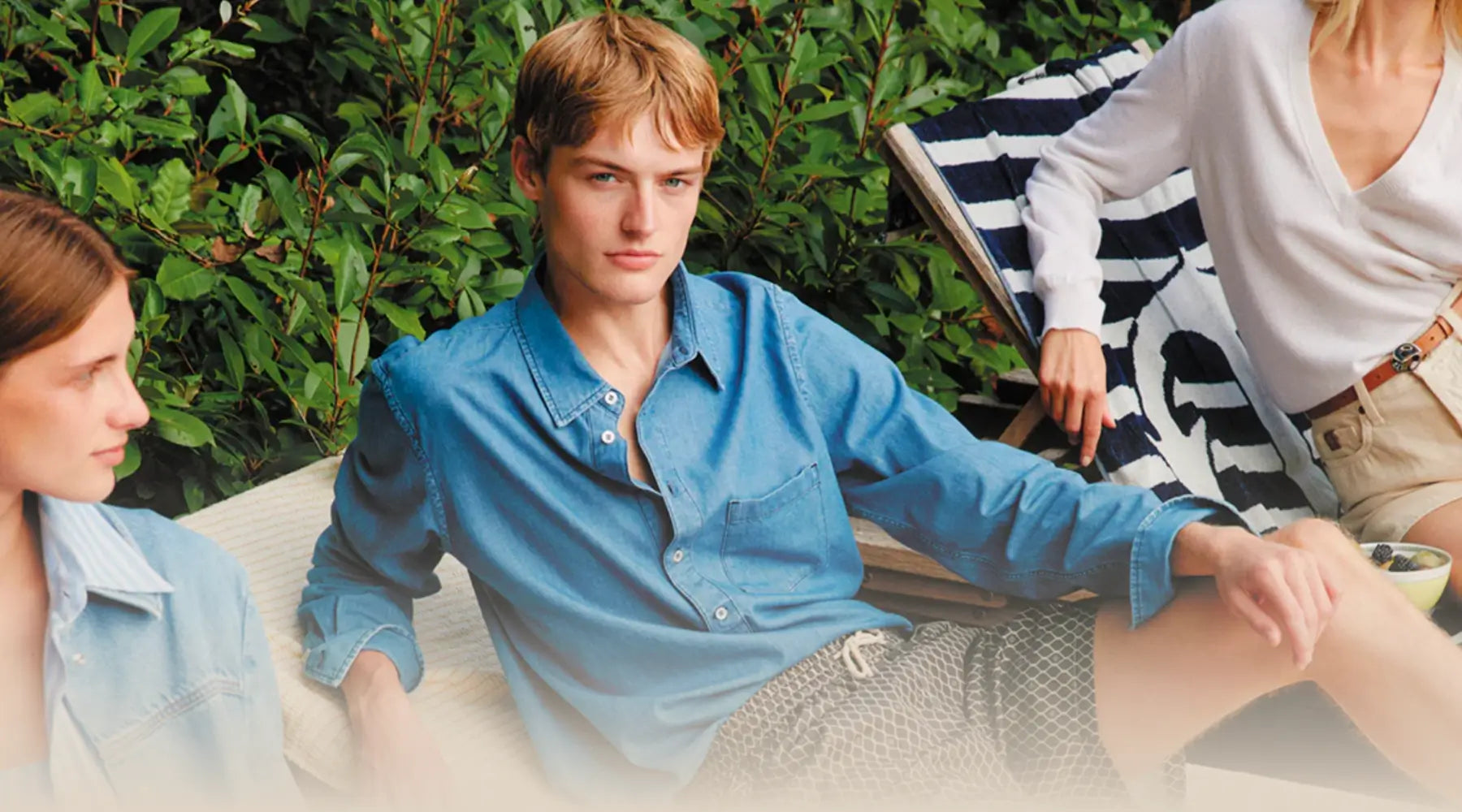
Green is the New Blue: Eco-Conscious Innovations in Jacob Cohën Denim
The Evolution of Sustainability in Fashion
From Fast Fashion to Responsible Luxury
The fashion industry has long been associated with rapid production cycles and environmental concerns. However, a significant shift is underway as brands transition from fast fashion to responsible luxury. This movement emphasizes quality over quantity, focusing on sustainable practices that prioritize environmental stewardship and ethical production.
Jacob Cohën exemplifies this transformation. Established in 1985, the brand has consistently prioritized craftsmanship and sustainability. Their approach involves meticulous attention to detail, ensuring that each garment is not only stylish but also environmentally conscious. By integrating sustainable materials and processes, Jacob Cohën sets a benchmark for responsible luxury in the denim industry.
Why Sustainability is More Than a Trend
Sustainability in fashion transcends mere trendiness; it's a fundamental shift in how brands operate. Consumers are increasingly aware of the environmental impact of their purchases, demanding transparency and accountability. Brands like Jacob Cohën respond to this demand by embedding sustainability into their core values, ensuring that eco-conscious practices are not just marketing tactics but integral to their identity.
Jacob Cohën's commitment to sustainability is evident in their use of organic materials, eco-friendly dyes, and biodegradable components. This holistic approach ensures that every aspect of their production minimizes environmental impact, reflecting a genuine dedication to sustainable fashion.
Who is Jacob Cohën?
A Brief History of the Brand
Jacob Cohën was founded in 1985 by Tato Bardelle in the Veneto region of Italy. The brand quickly gained recognition for its luxurious denim, combining traditional craftsmanship with modern aesthetics. In 2003, Nicola Bardelle, Tato's son, took the helm, propelling the brand to international prominence by introducing innovative designs and expanding its global reach.
Under Nicola's leadership, Jacob Cohën became synonymous with high-quality, tailored denim. The brand's philosophy centered on creating jeans that could seamlessly transition from casual to formal settings, emphasizing versatility and sophistication.
What Sets Jacob Cohën Apart in the Denim World
Jacob Cohën distinguishes itself through its unwavering commitment to quality and sustainability. Each pair of jeans is meticulously crafted in Italy, utilizing premium materials like Japanese Kurabo denim. The brand's attention to detail is evident in features such as hand-finished seams, unique washes, and signature scents infused into the fabric.
Moreover, Jacob Cohën's dedication to sustainability sets it apart. The brand employs eco-friendly practices throughout its production process, from sourcing organic cotton to using natural dyes. This commitment ensures that their products are not only luxurious but also environmentally responsible.

Jacob Cohën’s Commitment to Sustainability
Vision and Philosophy
Jacob Cohën's sustainability vision is rooted in the belief that luxury and environmental responsibility can coexist. The brand's philosophy emphasizes creating timeless pieces that transcend seasonal trends, reducing the need for constant consumption. By focusing on durability and quality, Jacob Cohën encourages consumers to invest in garments that last, thereby minimizing environmental impact.
This philosophy extends to every aspect of their operations. From sourcing materials to manufacturing processes, Jacob Cohën prioritizes sustainability. Their commitment is not just about meeting industry standards but about setting new benchmarks for eco-conscious luxury fashion.
How Eco-Consciousness Became a Core Value
Eco-consciousness became integral to Jacob Cohën's identity through a combination of consumer demand and intrinsic values. Recognizing the fashion industry's environmental challenges, the brand proactively sought solutions that aligned with their commitment to quality and craftsmanship.
Initiatives like the "Endless Luxury" collection exemplify this dedication. By creating fully compostable denim garments, Jacob Cohën demonstrates that sustainability is not an afterthought but a driving force behind their innovation. This approach ensures that eco-consciousness remains at the heart of the brand's evolution.
Materials that Matter: Organic and Recycled Fabrics
Organic Cotton: The Backbone of Sustainable Denim
Organic cotton serves as the foundation for Jacob Cohën's sustainable denim. Unlike conventional cotton, organic cotton is grown without harmful pesticides or synthetic fertilizers, reducing environmental impact and promoting soil health. This choice reflects the brand's commitment to responsible sourcing and environmental stewardship.
Jacob Cohën's use of organic cotton ensures that their denim is not only luxurious but also eco-friendly. The fabric's natural properties provide comfort and durability, aligning with the brand's emphasis on quality. By prioritizing organic cotton, Jacob Cohën sets a standard for sustainable materials in the luxury denim market.
Recycled Fibers and Eco-Friendly Alternatives
In addition to organic cotton, Jacob Cohën incorporates recycled fibers into their products. By repurposing materials, the brand reduces waste and conserves resources. This practice exemplifies their commitment to circular fashion, where products are designed with their entire lifecycle in mind.
Jacob Cohën also explores eco-friendly alternatives like natural rubber for stretch components, ensuring that even the smallest details align with their sustainability goals. These innovations demonstrate the brand's holistic approach to eco-conscious design, where every element contributes to a more sustainable product.
Low-Impact Dyeing and Washing Techniques
The Environmental Cost of Traditional Denim Production
Traditional denim production is resource-intensive, often involving significant water usage and chemical treatments. These processes can lead to environmental degradation, including water pollution and excessive energy consumption. Recognizing these issues, Jacob Cohën seeks to minimize the ecological footprint of their denim.
Jacob Cohën’s Eco-Wash and Dye Solutions
Jacob Cohën addresses these challenges by implementing low-impact dyeing and washing techniques. The brand utilizes natural dyes and avoids harsh chemicals, reducing water usage and preventing harmful runoff. Their innovative processes ensure that the aesthetic qualities of their denim are achieved without compromising environmental integrity.
By adopting these eco-friendly methods, Jacob Cohën not only enhances the sustainability of their products but also sets a precedent for responsible practices in the denim industry. Their commitment to innovation ensures that luxury and environmental consciousness go hand in hand.
Eco-Friendly Packaging and Logistics
Reducing the Carbon Footprint of Fashion Deliveries
Packaging often goes unnoticed, yet it plays a major role in the fashion industry’s environmental impact. Traditional packaging materials like plastic and non-recyclable cardboard contribute to landfill overflow and pollution. Jacob Cohën addresses this by embracing sustainable packaging practices that are as refined as their jeans.
Their packaging is made from recycled and biodegradable materials, minimizing environmental impact while still maintaining an elevated, luxury unboxing experience. By choosing low-impact logistics partners, they also cut down on transportation emissions. Sustainable shipping methods, carbon-neutral delivery options, and local sourcing help reduce the overall carbon footprint of each pair of jeans that ends up in your wardrobe.
Jacob Cohën doesn’t just focus on what's inside the box—they’ve rethought the box itself. In doing so, they underscore that sustainability isn't just about products but about every stage in the customer journey.
Sustainable Labels, Tags, and Finishes
It’s easy to overlook small details like tags and labels, but they’re important in Jacob Cohën's eco-conscious ecosystem. Instead of plastic tags or synthetic label materials, the brand uses organic and biodegradable alternatives such as recycled paper, cotton threads, and soy-based inks.
Even the signature metallic and leather labels—often a staple in luxury denim—are being reimagined. Jacob Cohën works with vegetable-tanned leather and recyclable metals to ensure that even the brand's emblematic flourishes stay aligned with its green philosophy. This attention to detail illustrates how deep sustainability runs in their design DNA.
Craftsmanship and Timeless Design
Built to Last: Why Quality is the New Sustainability
A cornerstone of Jacob Cohën's sustainable strategy is crafting denim that stands the test of time. The brand doesn’t chase fast-moving fashion cycles. Instead, they focus on timeless designs made from superior materials that won’t fall apart after a few wears. This durability means fewer replacements, less consumption, and ultimately, less waste.
By creating clothing that’s made to last, Jacob Cohën encourages consumers to invest in pieces they’ll wear for years—making sustainability a lifestyle, not just a buzzword. This “buy less, choose well” ethos is a game-changer in a world dominated by fast fashion.
Each garment is hand-finished by artisans, ensuring impeccable craftsmanship. These aren’t just jeans; they’re heirloom-quality pieces that embody both luxury and sustainability. And when you buy quality, you're not just elevating your wardrobe—you’re reducing your environmental impact.
Seasonless Collections with Enduring Style
One of the smartest eco-conscious moves Jacob Cohën has made is eliminating the need for seasonal reinvention. Their collections are intentionally designed to be seasonless. Rather than producing dozens of new styles each season, they refine and iterate on their classics—ensuring their pieces never go out of style.
This seasonless approach minimizes waste and streamlines production. It also encourages consumers to focus on personal style over trend-chasing, a move that’s as smart environmentally as it is aesthetically. Jacob Cohën proves that sustainable fashion doesn't mean sacrificing style—it means finding designs that resonate on a deeper level.
Ethical Manufacturing and Local Production
Made in Italy: A Commitment to Responsible Craft
Jacob Cohën proudly manufactures its garments in Italy, where labor standards and environmental regulations are among the highest in the world. This isn’t just about national pride—it’s about ethics. By keeping production local, the brand maintains transparency over working conditions, fair wages, and safe workplaces.
Local production also cuts down on emissions caused by shipping materials and garments across continents. It creates a more efficient, tightly controlled supply chain, which is essential in reducing fashion's environmental burden.
Working with small-scale, family-owned manufacturers, Jacob Cohën helps preserve traditional craftsmanship while maintaining strict quality controls. These artisans are not just employees—they’re partners in creating a more sustainable future for fashion.
Transparency in the Supply Chain
Sustainability starts with transparency. Jacob Cohën understands that to make meaningful change, every part of the production process must be visible and accountable. That’s why the brand is moving toward full traceability—tracking their garments from the cotton fields to the final product.
By openly sharing information about sourcing, materials, and production practices, Jacob Cohën invites customers to become part of the sustainability conversation. This transparency builds trust and sets a powerful example for other luxury brands.
Innovation and the Future of Sustainable Denim
R&D: Innovating for the Next Generation of Green Fashion
Jacob Cohën invests heavily in research and development to stay ahead in sustainable innovation. Whether it’s testing new biodegradable fabrics or pioneering low-water dyeing processes, the brand continually pushes the boundaries of what’s possible in eco-friendly fashion.
Their collaborations with textile laboratories and material scientists lead to breakthroughs like compostable elastane alternatives and smart denim that repels stains without toxic coatings. These innovations are shaping the future of fashion—where luxury and responsibility are inseparable.
The Circular Economy: Closing the Loop in Denim
In line with circular fashion principles, Jacob Cohën is exploring denim recycling and take-back programs. The goal is to ensure that every product lives multiple lives, whether through upcycling, resale, or full recycling.
Instead of garments ending up in landfills, they’re returned to the brand, disassembled, and repurposed. This loop closes the lifecycle of each piece, minimizing waste and maximizing value. Jacob Cohën’s investment in circularity ensures that their vision for sustainable denim doesn't stop at the point of sale—it extends far into the future.
Conclusion: Denim that Makes a Difference
Jacob Cohën is proving that green truly is the new blue. By integrating sustainability into every level of their operation—from organic cotton and eco-friendly dyes to ethical manufacturing and circular design—they’ve created a denim brand that doesn’t just look good, but does good.
In a world flooded with fleeting fashion, Jacob Cohën offers something timeless: luxurious, responsibly crafted denim that respects the planet. This isn’t just about clothes; it’s about making conscious choices that ripple into the future. When you wear Jacob Cohën, you wear innovation, integrity, and impact.


